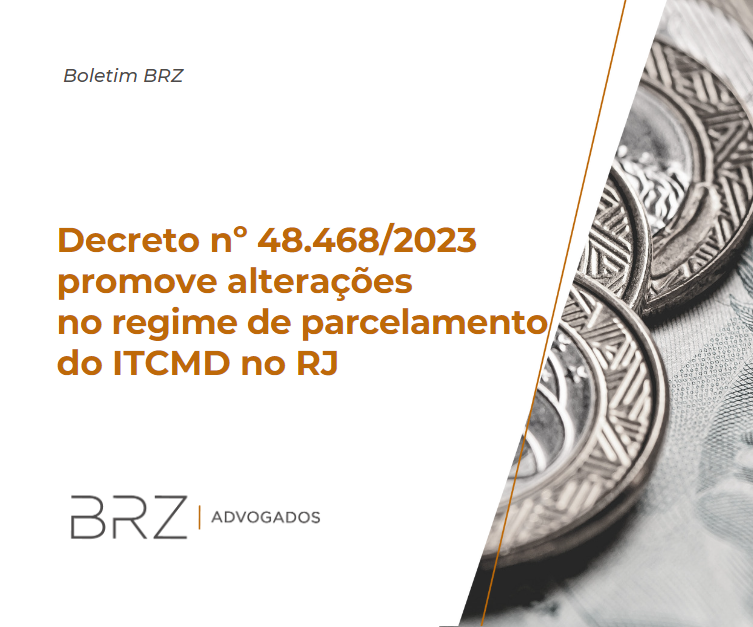Partial dissolution in closed capital corporations

Our partner Pedro Henrique F. Raimundo and our lawyer Isabela Hummel Hohl published in the portal of Revista Consultor Jurídico (ConJur) an article on the partial dissolution of closed capital corporations.
The article seeks to address the reasons why the obstacles imposed to partial dissolution of corporations no longer make sense when, in practice, such companies have personal obligations. According to the authors of the article, in these cases, the applicability of the provisions of the Civil Code relating to limited liability companies may be extended to closed corporations with regard to partial dissolution, including in relation to the exercise of the right of withdrawal and the exclusion of members.
Check out the full article: https://lnkd.in/eXKticvn
OPINION
Partial dissolution in closed capital corporations
By Pedro Henrique Raimundo and Isabela Hummel Hohl
Due to the main differences in the legal nature of corporations and limited liability companies, the Brazilian legislator imposed on corporations a different and more restricted treatment when it comes to its partial dissolution.
For limited liability companies, generally characterized by their personal obligations (intuitu personae), the Civil Code expressly provides for their partial dissolution in the following cases: 1) the right to remove a member by means of a mere notification to the other members, provided that the company’ term is open-ended — in most cases (article 1029); 2) the dissolution in relation to one member in case of death (article 1028); 3) the right to remove a dissenting member in case of relevant corporate modification (article 1077); 4) judicial exclusion in the various cases provided for by law, especially in the breach of the affectio societatis (article 1030); and 5) the extrajudicial exclusion of the member when so authorized by the company’s articles of organization and by means of a resolution at a meeting intended for such purpose when the majority of the members understand that one or more members are jeopardizing the continuity of the company, due to acts of undeniable severity (article 1085).
The fact is that not all hypotheses laid out limited liability companies with regard to partial dissolution are reflected in Law 6404/76 (Corporation Law) for the corporations. At a frivolous glance at the matter, the justification for greater legal restrictions imposed on corporations would be because of the intuitu pecuniae character of these companies, that is, because of the prevalence of the purpose of generating profits over the personal characteristics of its shareholders. This concept, which is better explained below, is not entirely applicable to most Brazilian corporations: closed capital corporations, which have evident and predominant characteristics of intuitu personae, despite adopting the guise of corporations.
From a strictly legal point of view, the legislation expressly provides for two hypotheses for the dissolution of corporations: 1) dissenter’s right of the shareholder, provided for in article 137 of the Corporation Law; and 2) impossibility of fulfilling the corporate purpose, provided for in article 559 of the Code of Civil Procedure, both of which discussed below.
Regarding the dissenter’s right, according to the Corporation Law, the dissenting shareholder has the right to withdraw from the company by means being paid off in the value of its shares when it comes to the following hypotheses of approval: 1) creation of shares of preferred stock or increase of existing classes of preferred stock, without keeping proportion with the other classes of preferred shares, unless already provided for or authorized by the bylaws (only the holder of shares that are harmed by this, article 137, I); 2) change in preferences, benefits and conditions for the redemption or amortization of one or more of the classes of preferred shares, or creation of a new and more favored class (only the holder of shares harmed by this, article 137, I); 3) reduction of mandatory dividend; 4) merger of the company, or its absorption by other company (the holder of a share that has liquidity and dispersion in the market will not be entitled to this, article 137, II); 5) interest in a group of companies (the holder of a share that has liquidity and dispersion in the market will not be entitled to this, Article 137, II); 6) change in the company’s purpose; spin-off of the company (only if there is a change in the corporate purpose, reduction of the mandatory dividend, or interest in a group of companies, article 137, III); 7) inclusion of an arbitration agreement in the bylaws (article 136-A), except if: a) the inclusion of the arbitration agreement is a requirement for admission of the company’s securities to trade in a certain listing segment on the stock exchange; or b) the inclusion is made in a publicly-held company whose shares have liquidity and dispersion in the market pursuant to article 137, II, “a” and “b”.
With regard to the possibility of partial dissolution in case the corporate purpose cannot be pursued, article 559 of the Code of Civil Procedure expressly establishes that “the action for the partial dissolution of a company may also have as its object the privately held corporation when demonstrated by a shareholder or shareholders representing five percent or more of the stock that said company cannot fulfill its purpose”. “Purpose” means the development of the company’s corporate purpose (means), in addition to the ability to produce and distribute profits to its shareholders (final purpose).
Also, in view of the absence of specific regulations in the Corporation Law, the current understanding is that this possibility is only applicable when the nature of the intuitu personae of the corporation is proven.
Having talked about the cases that the law allows for the partial dissolution of corporations, it is important to take a step back and analyze any grey area that may result in the extensive application of the effects of the rules of limited liability companies to corporations. This is precisely the case of the intuitu personae nature to which corporations may adhere in certain cases.
Apart from the discussion of publicly traded corporations, it is common in Brazil to use the structure of a closed corporation for several reasons, such as to seek greater freedom and legal certainty or the best tax and succession planning that this type of company offers. In these companies, the personal relationships between shareholders or their contributions to the development of the corporate activity are extremely relevant, the wish they have to associate with one another is evident (affectio societatis). Therefore, for these types of companies, it is correct to say that there is a predominance of intuitu personae, traditionally attributed to limited companies, so that the “capital” element that is so dear to corporations is moved to the background.
Thus, considering that the closed corporation may also follow the intuitu personae path, the logical conclusion is that breaking the affectio societatis among its shareholders may cause the extension of the applicability of the Civil Code with regard to the partial dissolution of the company, including in relation to the exercise of the right to withdraw and the removal of members, provided that the requirements of articles 1030 and 1085 of the Civil Code are met.
In this sense, according to the understanding of the STJ (REsp No. 1.400.264/RS, rapporteur Justice Nancy Andrighi, 3rd Panel, judged on 10/24/2017), the partial dissolution of a closed corporation, provided that intuitu personae is characterized, is possible when there is: 1) a break in the affectio societatis; and 2) absence of profits or distribution of dividends for a long time. It should be noted that for the granting of partial dissolution, all other aspects of the specific case must be observed and, especially due to the absence of an express provision in the Corporation Law, the partial dissolution of a corporation must be pleaded before the Courts and, therefore, ruled in favor by a sentence as the possibility of removal of a shareholder extrajudicially is not admitted like it is in limited liability companies.
Finally, pursuant to article 45 of the Corporation Law, the company shall then reimburse the dissenting shareholders for the value of their shares. The interpretation, derived from the very wording of the article, is in the sense that the reimbursement is applicable only in the cases expressly provided for by law: 1) the dissenter’s right shareholders have pursuant to article 137 of the Corporation Law; and 2) impossibility of fulfilling the corporate purpose, provided for in article 559 of the Code of Civil Procedure, whereas, in the other cases of extensive application of the Civil Code, the shareholder’s remuneration for the exit of the company will be subject to the appraisal of their equity, subject to the provisions of article 606 of the Code of Civil Procedure.
# brzadvogados #closedcorporation #corporatelaw # limitedliabilitycompanies



